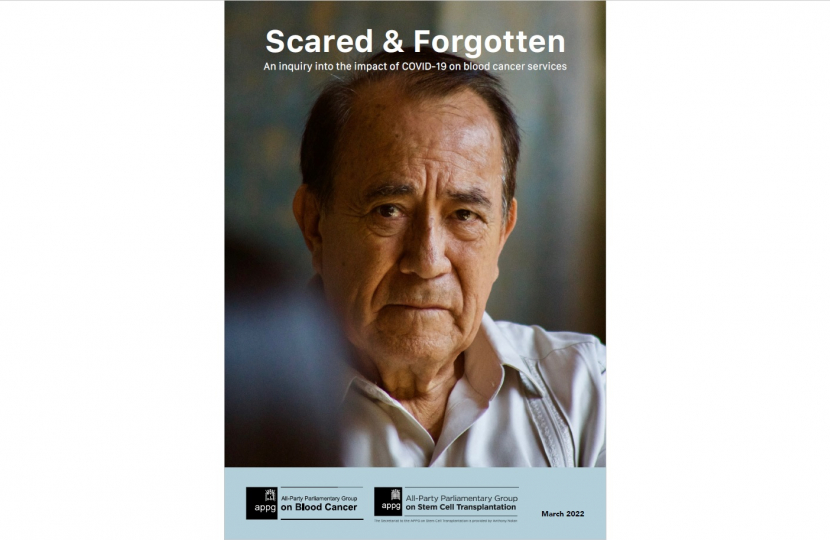
Crawley MP and Chair of the All-Party Parliamentary Group (APPG) on Blood Cancer Henry Smith has launched a new report from parliamentarians urging the Government to ensure that blood cancer services are equipped to recover from the pandemic.
The APPG on Blood Cancer and the APPG on Stem Cell Transplantation & Advanced Cellular Therapies have warned that the pandemic has led to more blood cancer diagnoses in emergency settings, when the likelihood of survival is worse.
In the APPGs’ joint report, Scared & Forgotten: An inquiry into the impact of COVID-19 on blood cancer services, MPs and Peers highlight NHS data showing that:
- More blood cancers were diagnosed through emergency presentation at A&E than any other route from May to September 2020 in England.[1]*
- New blood cancer diagnoses fell by 27 per cent in April and May 2020 compared to the same months in 2019[2], and as of September 2021 (the latest data available) blood cancer diagnoses remain below the average for 2019.[3]
Henry, who has chaired the Group since its formation in June 2016, said;
“Front-line NHS workers in Crawley are doing everything they possibly can to deliver timely and safe care to people with blood cancer.
“I want to see their efforts recognised and supported with the additional resources needed to diagnose blood cancer earlier, when it is more treatable.
“We must do everything we can to avoid a situation in which blood cancer survival falls after many years of progress.
“This is a personal issue for me and one which has affected my own family and others in Crawley.
“I will continue to stand up for blood cancer patients, and their support networks, in the House of Commons.”
People with blood cancer diagnosed in A&E are known to have significantly reduced chances of surviving compared to those diagnosed via an outpatient appointment. Only 40 per cent of people with blood cancer live for three years or more if they are diagnosed in emergency settings, compared to 77 per cent of those diagnosed via their GP.[4]
The report is the culmination of an inquiry held by the APPGs into the impact of the Covid-19 pandemic on blood cancer services. Experts who submitted evidence to the inquiry also expressed concern that the large drop in new blood cancer diagnoses at the height of the pandemic, combined with longer NHS waiting times[5], will lead to more people being diagnosed at advanced stages of disease, when they may have fewer treatment options.
Nigel Griffiths, who had a stem cell transplant nine years ago to treat acute myeloid leukaemia, stressed that the NHS needs funds and resource in order to recover.
Nigel said;
“I went to hospital for my annual check up a while ago and I’m still waiting for my blood test results, I’ve never had to wait this long before. I’ve been told that it’s due to staffing issues – they just don’t have the secretarial staff to type them up.”
Building on the evidence and testimony from blood cancer patients, families and professionals received during the inquiry, the APPGs are recommending:
- As soon as is feasible, the NHS should evaluate blood cancer outcomes during the pandemic, such as stage of diagnosis and survival compared to before the pandemic, to inform where additional targeted attention is required.
- Clearer and more ambitious targets for blood cancer survival over the longer term, to ensure that progress is made.
- This can only be realised with additional resource from the Government to meet increased demand, tackle the backlog and ensure equitable access to care.
A full list of recommendations can be found in the report which is available here.
Notes to Editors
- *This data is from the NHS COVID-19 rapid cancer registration and treatment dataset available at https://www.cancerdata.nhs.uk/covid-19/rcrd. Information on the number of new blood cancer diagnoses in England was taken from the “Demographic factors” tab, selecting “Cancer group: Haematological” and “Demographic level: Route to Diagnosis”.
[1] COVID-19 rapid cancer registration and treatment data; Route to diagnosis, new cancer diagnoses, England, January 2019 to September 2021 (Haematological cancers), available from: https://www.cancerdata.nhs.uk/covid-19/rcrd
[2] Data submitted to the joint inquiry by Cancer Research UK
[3] COVID-19 rapid cancer registration and treatment data; Proportion of previous activity, new cancer diagnoses, England, January 2018 to September 2021 (Haematological cancers, annual comparison 2021 vs 2019), available from: https://www.cancerdata.nhs.uk/covid-19/rcrd
[4] Blood Cancer UK, Over a quarter of blood cancer cases only diagnosed after emergency admission
15th October 2019: https://bloodcancer.org.uk/news/over-quarter-blood-cancer-cases-only-diagnosed-after-emergency-admission/
[5] NHS England and Improvement, Waiting Times for Suspected and Diagnosed Cancer Patients 2020-21 Annual Report: https://www.england.nhs.uk/statistics/wp-content/uploads/sites/2/2021/07/Cancer-Waiting-Times-Annual-Report-202021-Final.pdf

